Statement by Deputy Permanent Representative Dmitry Chumakov, at the meeting of the Inter-Agency Task Force on Chernobyl
Madame Modrator,
Dear Mr. Achim Steiner,
Excellences,
Dear Colleagues,
This year meeting of the Inter-Agency Task Force (IATF) on Chernobyl marks 35 years since the Chernobyl nuclear catastrophe happened. This tragic milestone is deeply rooted in the history of our country, and let me assure you it will never be forgotten.
We deeply appreciate the continuous work and supervision of the UNDP on Chernobyl dossier. And thank you, Mr. Steiner, for all efforts in strengthening the role of IATF in this process.
Madame Moderator,
In order to overcome the consequences of the disaster at the Chernobyl nuclear power plant, Russia and Belarus are constantly making efforts to protect the population, rehabilitate contaminated lands and gradually return them to a normal state, including through the implementation of joint programs and activities under the Union State. The relevant scientific and technical program was adopted one of the first within the framework of the Union State. In total, since 1998, four large-scale Union projects have been implemented, aimed at ensuring the safety of life and activities of citizens of the two States in the affected territories. These documents reflect and supplement the main directions of the state policy of Russia in this area.
Currently, the fifth Joint Action Program (for the years 2019-2022) is being implemented at the expense of the budget of the Union State (nearly 13 mln US dollars). The goal is to create conditions for the safe life of the population in radioactively contaminated areas, improve the systems of radiation safety of the population and agricultural production, create conditions for the return of radioactively contaminated areas to normal life. For this purpose, a complex of joint activities, research, development, technological work is being implemented. It is envisaged to develop new approaches to technologies aimed at reducing the level of radionuclides in agricultural products, reducing the risks of transboundary transfer of radionuclides in emergency situations and increasing the efficiency of their elimination. Inspections of resettled (alienated) territories will be carried out for the possibility of their return to economic circulation, joint measures for integrated radioecological monitoring of territories exposed to radioactive contamination. These works will be carried out in the Gomel and Mogilev regions of Belarus and in the Bryansk region of Russia.
Within the framework of the document "Priority directions and priorities for the further development of the Union State for 2018-2022." also included a section on environmental, nuclear, radiation safety and overcoming the consequences of the disaster at the Chernobyl nuclear power plant, which provides for the implementation of an agreed policy in the field of environmental safety and environmental protection, ozone layer protection, hydrometeorology, combating climate change, monitoring the state and pollution of the environment.
In addition, joint measures for comprehensive medical care and rehabilitation of citizens of the two countries are also being implemented, in particular, treatment and rehabilitation of children from the areas most affected by the Chernobyl disaster. In 2020, these activities were canceled due to COVID-19 restrictions, but this practice will resume after the sanitary and epidemiological situation normalizes.
Thank you very much, Madame Moderator, for giving us the floor and we are looking forward to receiving an update from the UN country teams and UN agencies engaged in Chernobyl cooperation. This information is of high interest to us.
